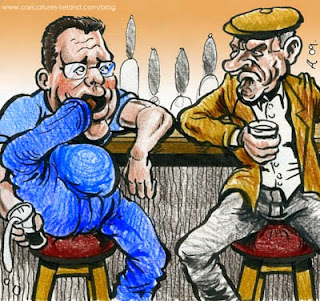Meanwhile, behind the scenes, this sanctimonious scribbler was going to unusual lengths and a fair bit of trouble to order an entire case of material goods, in the shape of marmalade.
Yep, you read that right. The orangey spread you put on your toast.
Not a very important ingredient in the recipe of life you might well think, and I’d fully agree. Sometimes my behaviour surprises me too, not always in a good way.
For years I bought the Chivers Olde English, and when that disappeared from the shelves I switched to Marks and Sparks’ equivalent, until they changed their recipe, turning a supposed spread into a solid glutinous lump.
Scanning the supermarket shelves I spotted a dark thick cut marmalade made by a County Cork company called Folláin, which was splendid.
Just as you might now be wondering how long you can sustain any interest in my marmaladey prattlings, I had never wasted a moment of my valuable time thinking about the stuff.
Why would I, in a lifetime that offers love and disease, war and joy and football?
I hadn’t and didn’t, right up to the time when the supermarkets stopped stocking Folláin’s dark thick cut.
Only old fogeys such as your scribbler like bitter marmalade with chunky peel. In the world of marmalade (I know, that sounds so sad) the trend is most definitely towards a sweet pale peel-free gunk.
I tried others brands and found them sadly lacking, which is the point at which a man of healthy mind would settle either for the least disgusting brand or just let the whole thing go.
Yet for some reason I didn’t. Despite lists a metre long of genuinely important things I must do, I found myself studying the label of my last bottle of Folláin, looking for contact information.
At the same time as I checked the label, a niggling worry ran around my brainbox. My behaviour was becoming a mite odd. Had
I now officially left behind the realms of ‘Quirky’ and strayed into the great plains of ‘Eccentricity’?
Doubtless many of you who know me will take great pleasure in reassuring me that I left eccentricity behind ages ago and have lived long in the land of ‘Weirdo.’
Most people seem to believe that being eccentric sounds fun, but as it turns out, eccentricity is a very subjective matter.
Writers of period drama portray the classic English eccentric as a happy human cocktail of haphazard disorder and benevolence, but my experience of the type was very different, burned into my being at Prep School.
Unlike proper State schools, English Preparatory and Public Schools do not require their teachers to be qualified. Any kind of degree from an Oxbridge university will see you given a job, with control over a class of 7 year-old boys and access to dormitories, within a culture where corporal punishment is seen as a damn fine thing.
Throughout my education I was taught by eccentrics, some of whom were marvellous and inspiring, others dark and sadistic.
One of my teachers was a barrel-shaped being nicknamed ‘Bippy’. With his trouser waist up to his nipples, his neckless anaemic sweaty head as amorphous as a deflated balloon, he would stand in front of me, raise his magnifying glass to his eyes and squeak in his whiny high pitched voice:
“Boy! Are you a good detective?”
If you saw him near a playground you’d call the cops, but he was harmless; just eccentric and ineffectual.
Then there was Mr. Brown, with his crazy mess of curly grey hair, who used to come to class brandishing a size 13 gym shoe.
“Boys, this is Whhhhhistling Whhhhinny. Any trouble out of you and you’ll feel the force of Whistling Whinny and you will not like it. You will not.”
Although teachers’ nicknames offered important clues to us boys, I failed to take heed and stay away from the biology teacher known as ‘Anus Ganus.’
Those memories stayed repressed for over 40 years, drifting for the first time into my consciousness as I drove through Connemara 5 years ago.
Clearly a stark border exists between harmless eccentric souls and sexual abusers, but my exposure to such a medley of madness throughout my youth has made me suspicious of ‘eccentric’ as a notion.
Hence my misgivings about ordering the marmalade. While it’s doing no harm (except to my waistline) it does seem excessive to order it privately. Smacks of aristocratic behaviour. Oh yes, Master Charlie, he has his marmalade delivered so he does, from County Cork it comes, because there’s no other marmalade that’ll do for him. Very particular, Master Charlie is, so he is.
Then there’s my friend Jane to consider, who rightly ridiculed me for writing about cheese and ham toasties a while back. In the face of worldwide famine and deprivation, she was disgusted that I might ponder such a First World problem. Thing is, that’s where I live (just about!) and hell, if marmalade is as batty as I become, I can live with it.
After a couple of chats on the phone to Folláin, I sent an order and a cheque by mail, for a case of 12 jars.
All this preserve acquisition activity clashes just the teensiest bit with my plan to lose weight by giving up bread, but hey, that’s the price of eccentricity I suppose.
Having gone out of my way to source and purchase something that most folk wouldn't waste a moment on, have I finally found pleasure in shopping?
Have I become materialistic? Well maybe just a little.
Quite possibly right now, somewhere in rural Ireland, there’s an eccentric scribbler leaping up and down yelling:
“Yay! My marmalade has arrived!”
©Charlie Adley
24.08.15.










